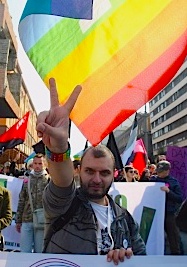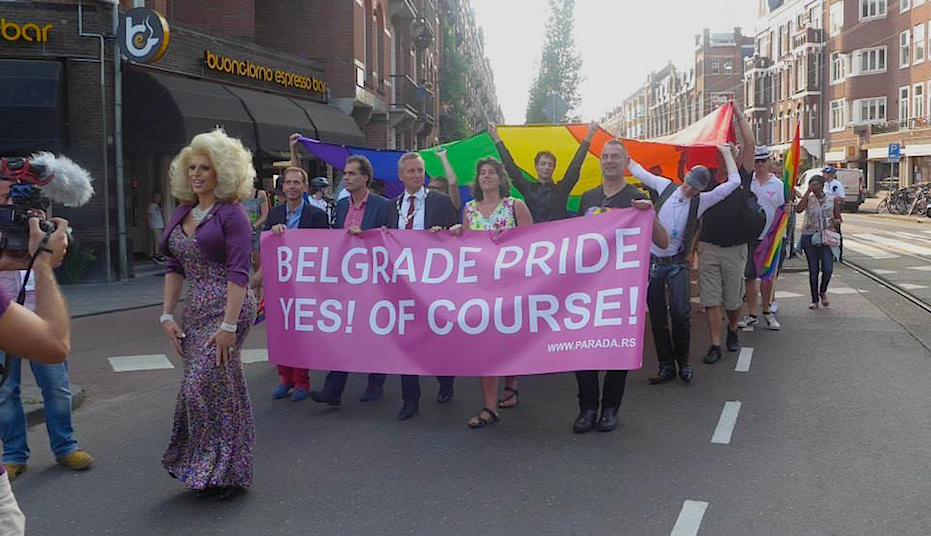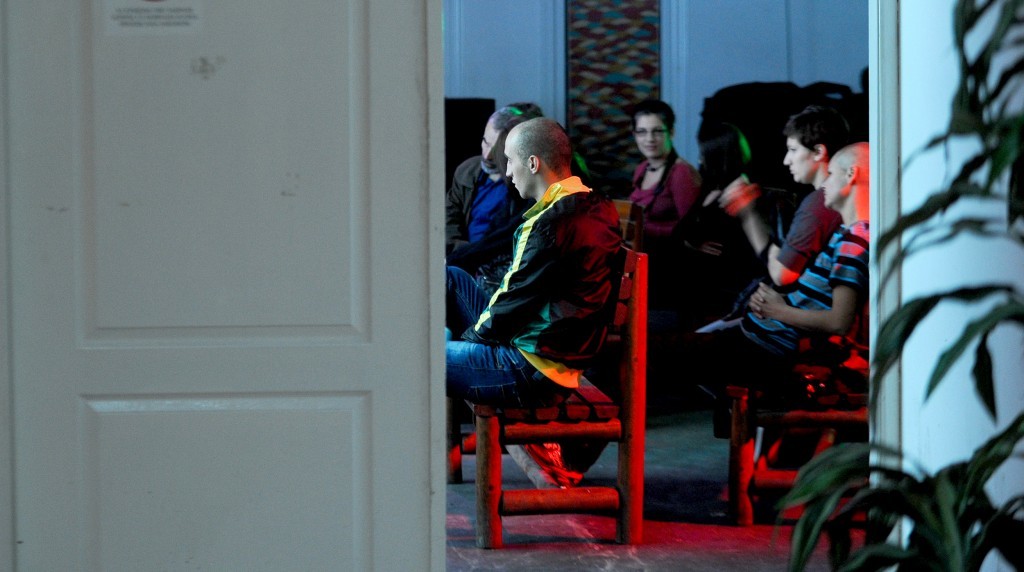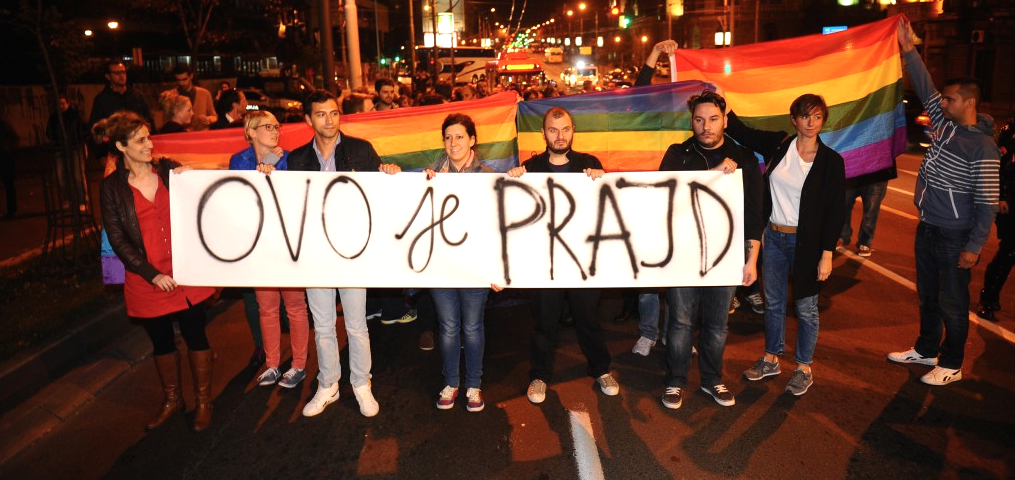Police strikes and religious rhetoric cannot crush Serbian Pride
 With the democratic rights of Serbia’s LGBT community effectively held to ransom by Belgrade’s police force, the fate of the controversial Pride Parade hangs in the balance once more.
With the democratic rights of Serbia’s LGBT community effectively held to ransom by Belgrade’s police force, the fate of the controversial Pride Parade hangs in the balance once more.
The Serbian state, Orthodox Church and extremists have successfully crushed the Pride Parade in recent years.
The authorities could have been handed the justification to pull the plug on Sunday’s parade, too, thanks to opportunely-timed strike action being threatened by Belgrade police unions.
While police claim they will step in to protect the city if called upon, they have presented a perfect excuse for authorities that have previously used security issues to ban the gathering. Whether they choose to use their power to block the parade remains to be seen.
Belgrade Pride divides opinion along unusual lines
Whichever way the decision goes, it is fair to say that the Belgrade Pride Parade divides opinion, and not always along the lines one might expect.
I have seen young Serb urbanites who proudly proclaim open-minded attitudes and freedom of expression turn stony faced when talk turns to the parade, while middle-aged villagers and working class parents simply shrug their shoulders in acceptance of how the world turns and times change.
These people have not surrendered to the times or given up on their values. They have seen what is important in life and appreciate truly important values: love for each other, humility in themselves and respect for others.
When reading Serbian press or the colourful comments on social media, it would seem that the Parade threatens to rip a whole in society. The hatred that is vented and destruction that is projected is almost biblical in scale, making their outbursts seem almost comical when seen from abroad.
That might be, if not for some of the most over heated comments coming from the diaspora, from people who were not even born in Serbia and have no intention to live there in future.
Pride for more than one day. Pride for life
Those who question why gay people need to march should consider the value of living with confidence and self-respect, as well as their own responsibility to stand up against prejudice and inequality in any form.
It should be remembered that the Pride Parade is not a standalone event, although it is the focus of all the anger, frustration and protest generated by ignorance and misunderstanding.
Pride is more than a party or a flag-waving walk through the city. It is more than the week or discussions, debates and public information events to encourage understanding that have preceded Sunday’s planned parade.
Pride is allowing people to live their lives as they are. It is young people being comfortable in their own skin, being honest with themselves and open with those closest to them. It is being able to walk the streets, hold a job and talk with family without fear of prejudice or violence.

These should be basic year-round rights of everyone in any country. They should be unquestionable, not to be granted or withheld. They should be expected by and for all.
That is why international celebrities such as Cyndi Lauper, Holly Johnson, Kim Wilde, Boy George, Miriam Margolyes and Stephen Fry have voiced their concern about the situation in Serbia, and why LGBT communities in European cities such as London and Amsterdam have come out in support of their Belgrade friends.
While the authorities have a responsibility to protect human rights, pride needs to begin at home, within the safety, comfort and support of a loving family. That is what should happen, but often the reality can be very different. The pressures and concerns of young people who wish to come out can be intense.
Gay teenagers in need of family support
It should be shameful for any society when teenagers can be so traumatised that they consider taking their own life due to the shame and hopelessness they feel. That is the case for many young people in Serbia, due to the bigotry of people who refuse to accept that we are not all the same.
Of course, it is always hard to come out as gay. There will be questions and concerns, but a lack of communication can inhibit understanding of the issues. Some people believe that by not saying the actual words they will prevent the situation from being real, leading many to live a lie.

Such denial and avoidance is too common in the Balkans, where the traditional structures of family, religion and society can force people to live a life of shame and denial, hiding their sexuality from family and friends, even husbands and wives.
All people deserve to live with dignity and respect, refusing to accept violence, prejudice or abuse. It is not right that one group still lives with these fears.
Homophobia of Serbian Orthodox Church
In recent years, the Serbian Orthodox Church and family groups have become the popular face of the movement, crusading for family values and doctrine to crush the basic rights of LGBT people in Serbia.
The less wholesome face of Serbian nationalists, right wing extremists and football hooligans have taken a back seat of late. They have become less upfront since the thuggery and violence that marred previous attempts to hold the Pride Parade.
The Serbian Government and security services have similarly played a keen game. Constitutional courts have backed the right to gather peacefully and so officials have used safety concerns as their reason for preventing the parade.
It would seem that the shame of a state admitting that it cannot protect its own people on the streets of their capital is less humiliating than being seen to bow to formidable religious leaders and pressure groups.
Such reasoning also allows the state to shrug in the face of international condemnation and veiled threats over EU membership. They have found a more palatable excuse for the same outcome: the hindrance of fundamental human rights for a significant group in society.
Can Serbia claim democracy, human rights and adherence to rule of law?
Democracy, human rights and an active civil society in line with a transparent legal process are a basis for society. These are not modish pipe dreams; they are as old as the great civilisations. Claims by the Orthodox Church that core values are being eroded by such concepts are paper-thin.
It would be good to think that Belgrade Pride could be seen as an opportunity rather than a threat. It would not be an endorsement of any behaviour or surrendering to the evils of the West, as some would claim. It would show that Serbia can protect the freedoms of its people and maintain safety on its streets, rather than buckle to terror groups.
It would be nice to see the Orthodox Church show basic humanity and tolerance, too. But that is unlikely to happen any day soon.
For Serbia to become a more enriched and safer place in which all Serbs can live freely it will call for the whole of society to engage in a process of discussion and understanding.
When people can accept their neighbours, be tolerant in their community and support their family, a wave can sweep through society, gently and without shock.
Lasting change will take hold when people can embody the fundamental values of love, faith and hope for all, starting with those closest to them.
Why is it so hard to realise that makes us different can also make us stronger. This is not an issue that is going away.
![]() This comment piece was originally commissioned by Balkan Insight, a product of BIRN, the Balkan Investigative Reporting Network.
This comment piece was originally commissioned by Balkan Insight, a product of BIRN, the Balkan Investigative Reporting Network.



No comments yet.
Be first to leave your comment!